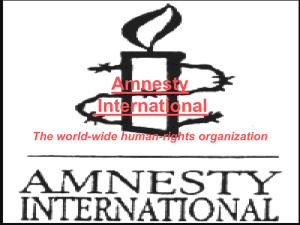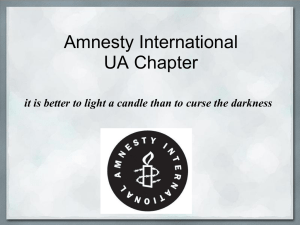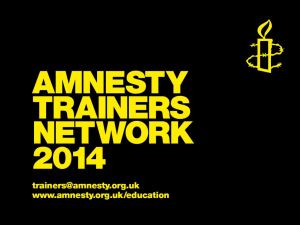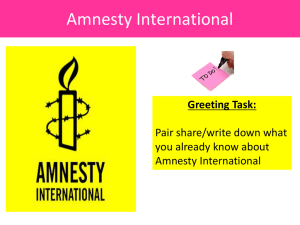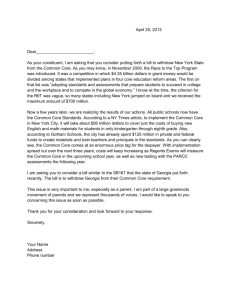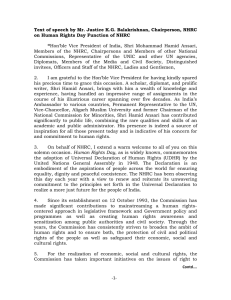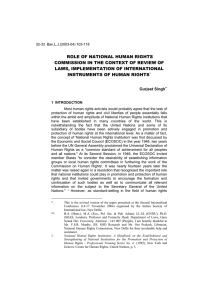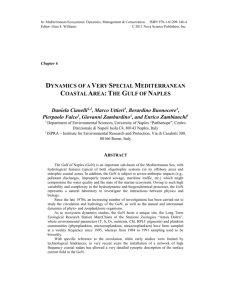NHRC Chairperson suggests PM not to withdraw the cases of
advertisement
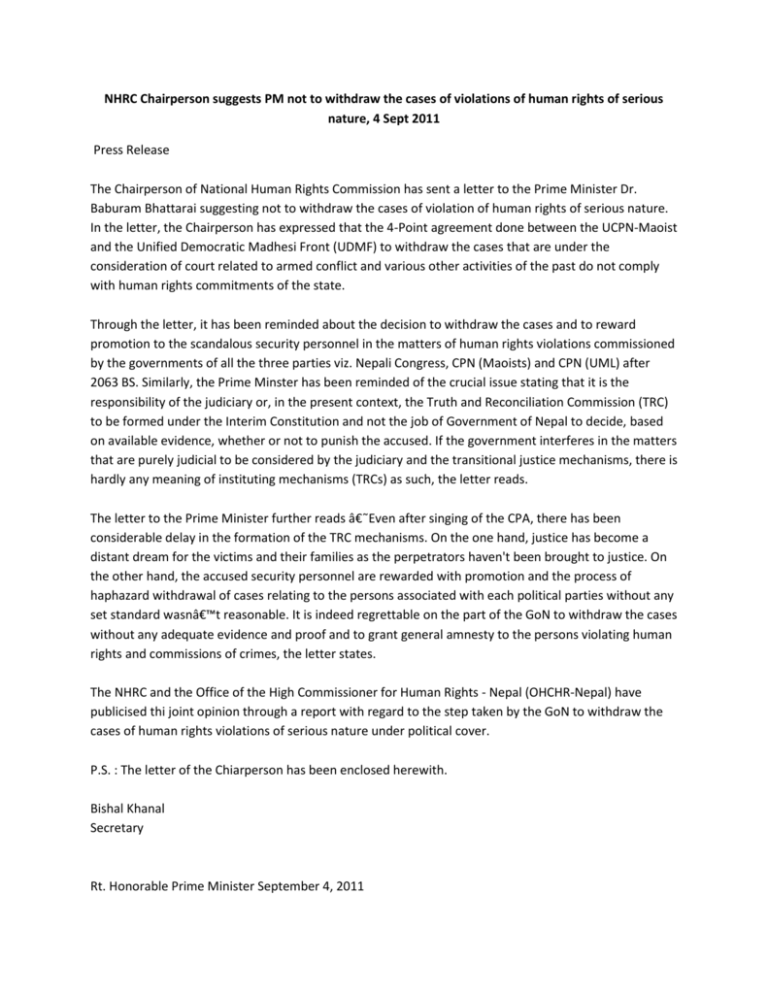
NHRC Chairperson suggests PM not to withdraw the cases of violations of human rights of serious nature, 4 Sept 2011 Press Release The Chairperson of National Human Rights Commission has sent a letter to the Prime Minister Dr. Baburam Bhattarai suggesting not to withdraw the cases of violation of human rights of serious nature. In the letter, the Chairperson has expressed that the 4-Point agreement done between the UCPN-Maoist and the Unified Democratic Madhesi Front (UDMF) to withdraw the cases that are under the consideration of court related to armed conflict and various other activities of the past do not comply with human rights commitments of the state. Through the letter, it has been reminded about the decision to withdraw the cases and to reward promotion to the scandalous security personnel in the matters of human rights violations commissioned by the governments of all the three parties viz. Nepali Congress, CPN (Maoists) and CPN (UML) after 2063 BS. Similarly, the Prime Minster has been reminded of the crucial issue stating that it is the responsibility of the judiciary or, in the present context, the Truth and Reconciliation Commission (TRC) to be formed under the Interim Constitution and not the job of Government of Nepal to decide, based on available evidence, whether or not to punish the accused. If the government interferes in the matters that are purely judicial to be considered by the judiciary and the transitional justice mechanisms, there is hardly any meaning of instituting mechanisms (TRCs) as such, the letter reads. The letter to the Prime Minister further reads ‘Even after singing of the CPA, there has been considerable delay in the formation of the TRC mechanisms. On the one hand, justice has become a distant dream for the victims and their families as the perpetrators haven't been brought to justice. On the other hand, the accused security personnel are rewarded with promotion and the process of haphazard withdrawal of cases relating to the persons associated with each political parties without any set standard wasn’t reasonable. It is indeed regrettable on the part of the GoN to withdraw the cases without any adequate evidence and proof and to grant general amnesty to the persons violating human rights and commissions of crimes, the letter states. The NHRC and the Office of the High Commissioner for Human Rights - Nepal (OHCHR-Nepal) have publicised thi joint opinion through a report with regard to the step taken by the GoN to withdraw the cases of human rights violations of serious nature under political cover. P.S. : The letter of the Chiarperson has been enclosed herewith. Bishal Khanal Secretary Rt. Honorable Prime Minister September 4, 2011 Office of the Prime Minister and Council of Ministers Singh Durbar, Kathmandu Nepal Subject: Case Withdrawal and Amnesty Excellency, First of all, I would like to extend my best wishes and felicitation to Your Excellency for being elected as the Prime Minister and to all the honorable ministers in the government. There has been enough reasons for us to be assured now that the peace process in your leadership will gain momentum towards the logical conclusion in view of the achievements made formerly during your term as the Finance Minister and also presently, your promptness to hand over the keys of the armed container to the Special Committee after the UCPN (Maoists) came to the power. Peaceful environment and human rights are inseparable and interdependent. Peaceful environment is an integral to human rights. It is, therefore, obvious for me to anticipate your early and strong additional initiative in other factors of peace process from your side. In this context, it is pertinent to refer the past activities that have been relevant. In short, the days that followed the Comprehensive Peace Accord (CPA) do not appear to be encouraging from human rights perspectives. It seems that most of the days were spent in the derailment of the peace process rather than sincerely implementing the commitments on human rights. The publication of NHRC's periodic reports on CPA elucidate about this. The last report among those published is enclosed herewith fro your perusal. Crimes related to the violations of human rights and humanitarian laws committed during the conflict period are not only the issue of national laws but also fall under international laws. Civil society members, human rights activists and world community are keenly watching the development in this regard. In the recent past, action has been taken in international criminal court against the cases with regard to human rights violations committed during the conflict period in Yugoslavia, South America and Africa. It is a normal judicial process to file the case and procure judgment for the punishment against the war crime or the crime against humanity. In general, there occurs delay in normal judicial process along with the increasing expenses incurred for such process and also the relief and compensation can't be made available to the victim party promptly and effectively. However, in internal strife, since the rivals in the conflict belong to the same state, society and village, reconciliation mechanism can be instituted purposely for the sake of mitigating the inimical attitude between the victims and perpetrators. Under such circumstances, apart from the peace committee, transitional justice mechanism is espoused as an alternative to settle down the crimes of special circumstances among the crimes committed during the conflict in an easy and simple manner. We do have objective and values enshrined in the Interim Constitution of Nepal - 2007 preordained to internalize the CPA. It is a significant endeavor of transitional justice to have the conflict victims and their families provided with immediate relief and compensation from the side of the state. It is indeed admirable that this has gradually been proceeding for accomplishment. Even after elapsing of 5 years of CPA, there has been considerable delay in the formation of the Commission on Disappearance and the Truth and Reconciliation Commission (TRC) though some attempts have been made by the GoN with regard to transitional justice. As the situation appears to me now, justice has become a distant dream for the victims and their families as the perpetrators haven't been booked due to the considerable delay in forming these commissions intended to address the issues of human rights violations occurred in the conflict period. On the other hand, the accused security personnel are rewarded with promotion and the process of arbitrary withdrawal of cases against the persons affiliated to each major political party without following any reasonable and prudent standard has obscured criminal justice. Such actions are ostensibly making government's policies incomprehensible making withdrawal of cases and grant of amnesty to convicts not transparent and reasonable. The withdrawal of cases without any basis and standard often invite debate in both national and international level. Legitimacy of such practices or laws upon which they are based, are liable to be challenged due to lack of clarity, reasonability or having any justifiable standard. I must emphasize here that the cases of human rights violations occurred during the decade long armed conflict and those cases pertaining to post conflict period cannot be placed in the same category under the CPA and the Interim Constitution of Nepal. It is, therefore, by design, perceptible that it wouldn't be appropriate to treat them at par and apply uniform standard to the cases of both period. This would not be consonant with justice, wisdom and norms and values of international human rights. NHRC has perceived this clearly and would like to be explicit in this regard. Your Excellency is well aware of the fact that the decision to withdraw the cases and to reward promotion to the security personnel already convicted of human rights violation which was done by the governments of all the three major parties viz. Nepali Congress, CPN (Maoists) and CPN ( UML) have been the issue of intense debate and disapproval among the entire human rights communities. Yet, the agreement has been reached between your party- the UCPN-Maoist and the UDMF to withdraw all the cases related to the Maoist armed conflict and movements of Madhesis, Janajatis, Dalits, Tharuhat and disadvantaged groups and to grant amnesty in cases instituted against them. NHRC, therefore, expresses serious concern and has apprehension of the withdrawal of cases which might include the grave cases of human rights violations and crimes against humanity. Specially, the act of withdrawal of cases related to abduction of the citizens for ransom, killing, violence and torture perpetrated on the ground of personal grudge and interest would be apparently against international humanitarian law and human rights. Undeniably, fingers are often raised on the legitimacy to withdraw such cases of criminal offences against human rights and to grant general amnesty to the accused. GoN has been oblivious in forming the Truth and Reconciliation Commission (TRC)- the would-be mechanism to address such issues. Of late, You Excellency, on behalf of the GoN, have expressed before the human rights activists that cases of fallacious nature would be withdrawn. Is it not the job of a judicial administration or in the present context, the TRC formed under Interim Constitution to decide, based on available evidences, whether the case in question is true or false or fabricated? If the government interferes in the matters that are purely judicial and to be handled by the established judiciary and the transitional justice mechanism, there would be no merit in establishing those mechanisms afterward. The proclaimed agenda of the agreement on the withdrawal of cases and grant amnesty even before Your Excellency assumed your present office has stumped human rights activists throughout the nation. Albeit there are provisions to withdraw the cases other than seeking general amnesty and the cases related to the individual property, by order of the Government and at the consent of the Court pursuant to the Article 151 of interim constitution, 2007 and the Article 29(1) of Government Prosecution Related Act 2049, the unconditional implementation of such provisions is regrettable. The provisions such as withdrawal of cases, granting amnesty or remission of sentence without setting out justifiable norms and standard compatible to court, court martial or any other judicial court or quasi-judicial body at the request of the government would bring lawlessness, impunity and legitimizing the crime. This kind of erosion in values is obviously dangerous. NHRC is in the view that the constitutional or legal provisions pertaining to withdrawal or grant of amnesty without prior probe or investigation should have appendage attached to conform to globally recognized international human rights norms and values. NHRC and Office of the High Commissioner for Human Rights-Nepal (OHCHR-Nepal) have jointly expressed their stand in this context and a copy of which has been enclosed herewith for your reference. Therefore, it is indeed regrettable, if it happens on the part of the GoN, to withdraw the cases without ascertaining adequate evidences and proofs and to offer general amnesty to the persons accused of crimes. It is understandable that this will not only sadden the international community, Nepalese society and the entire human rights community who believe in rule of law but also depict the image of GoN as insensitive to human rights issues than in the past. I, therefore, earnestly advise Your Excellency to think seriously, consult national human rights related mechanisms and do sufficient groundwork before taking any decision in this regard. Chairperson Kedar Nath Upadhyay
